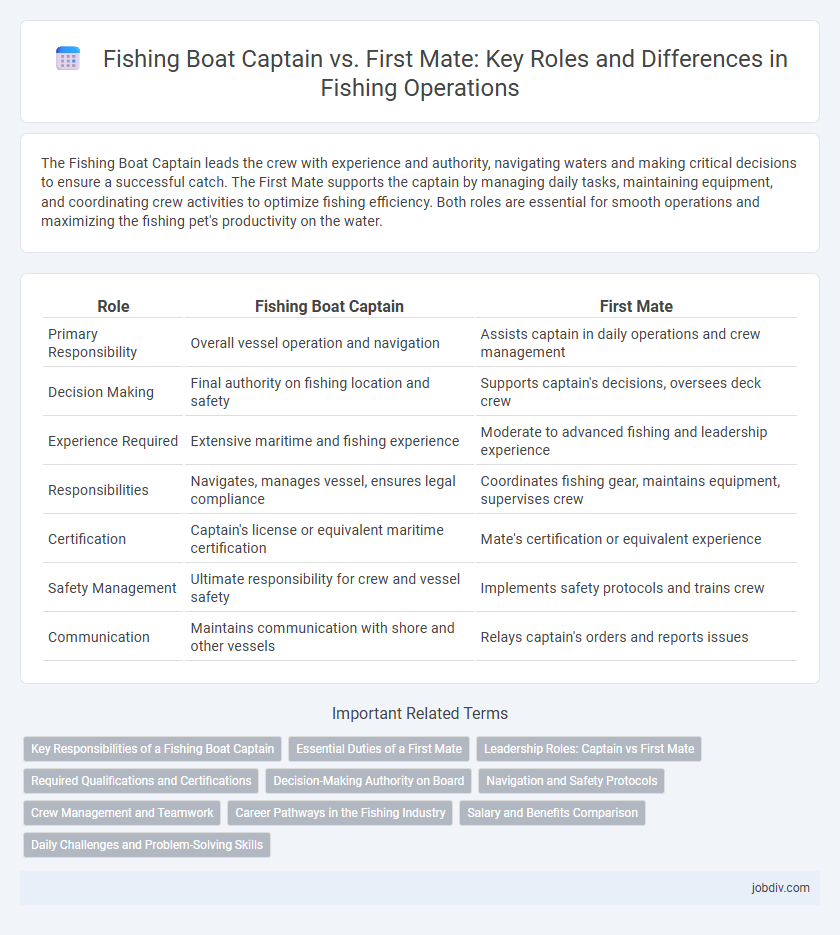The Fishing Boat Captain leads the crew with experience and authority, navigating waters and making critical decisions to ensure a successful catch. The First Mate supports the captain by managing daily tasks, maintaining equipment, and coordinating crew activities to optimize fishing efficiency. Both roles are essential for smooth operations and maximizing the fishing pet's productivity on the water.
Table of Comparison
| Role | Fishing Boat Captain | First Mate |
|---|---|---|
| Primary Responsibility | Overall vessel operation and navigation | Assists captain in daily operations and crew management |
| Decision Making | Final authority on fishing location and safety | Supports captain's decisions, oversees deck crew |
| Experience Required | Extensive maritime and fishing experience | Moderate to advanced fishing and leadership experience |
| Responsibilities | Navigates, manages vessel, ensures legal compliance | Coordinates fishing gear, maintains equipment, supervises crew |
| Certification | Captain's license or equivalent maritime certification | Mate's certification or equivalent experience |
| Safety Management | Ultimate responsibility for crew and vessel safety | Implements safety protocols and trains crew |
| Communication | Maintains communication with shore and other vessels | Relays captain's orders and reports issues |
Key Responsibilities of a Fishing Boat Captain
A fishing boat captain holds ultimate responsibility for navigation, crew management, and overall safety at sea, ensuring that fishing operations comply with maritime laws and environmental regulations. They oversee route planning, monitor weather conditions, and make critical decisions regarding fishing locations to maximize catch efficiency. The captain also handles communication with port authorities and manages the vessel's maintenance and emergency preparedness.
Essential Duties of a First Mate
A first mate on a fishing boat manages daily operations, oversees crew safety, and ensures efficient fishing processes while supporting the captain's directives. They are responsible for navigation assistance, maintaining equipment, and handling emergency situations to keep the vessel and crew secure. Their role is critical in coordinating fishing activities, managing catch storage, and maintaining compliance with maritime regulations.
Leadership Roles: Captain vs First Mate
The fishing boat captain holds ultimate responsibility for the vessel's navigation, safety, and decision-making during fishing expeditions, ensuring compliance with maritime regulations. The first mate acts as the primary assistant, managing the crew and maintaining operational efficiency under the captain's direction. Leadership roles distinguish the captain as the authoritative figure, while the first mate serves as the key executor of the captain's orders and a liaison between crew and command.
Required Qualifications and Certifications
Fishing boat captains must hold a Coast Guard captain's license, demonstrate extensive maritime navigation skills, and have robust leadership experience to ensure crew safety and efficient operations. First mates require at least a Mate's license or equivalent certification, strong knowledge of safety regulations, and the ability to assist with daily vessel management under the captain's supervision. Both roles necessitate proficiency in maritime communication, safety drills, and fishing industry regulations but differ significantly in responsibility scope and certification level.
Decision-Making Authority on Board
The Fishing Boat Captain holds primary decision-making authority on board, responsible for navigation, safety, and overall vessel operations. The First Mate executes the captain's orders, manages crew tasks, and oversees daily deck activities but defers critical decisions to the captain. Clear hierarchy in decision-making ensures efficient management and safety during fishing expeditions.
Navigation and Safety Protocols
A fishing boat captain oversees navigation by charting courses, interpreting weather data, and making critical decisions to ensure crew safety during voyages. The first mate assists in implementing safety protocols, conducting equipment checks, and maintaining communication between the captain and crew to manage risks effectively. Both roles collaborate closely to uphold navigation accuracy and enforce safety regulations, minimizing hazards in challenging marine environments.
Crew Management and Teamwork
Fishing boat captains oversee crew management by assigning specific tasks, ensuring safety protocols, and maintaining clear communication to optimize fishing operations. First mates support the captain by coordinating crew activities, managing day-to-day tasks, and fostering teamwork among deckhands to maintain efficiency. Both roles require strong leadership and collaboration skills to ensure successful fishing expeditions.
Career Pathways in the Fishing Industry
Fishing boat captains typically have extensive experience and advanced certifications, often progressing from roles such as deckhand and first mate by demonstrating leadership, navigation, and boat handling skills. First mates serve as second-in-command, responsible for crew management and operational tasks, gaining practical expertise that is essential before advancing to captaincy. Career pathways in the fishing industry emphasize hands-on experience, maritime safety training, and knowledge of fishing regulations, enabling first mates to transition into captain roles over time.
Salary and Benefits Comparison
Fishing boat captains earn a significantly higher salary than first mates, with average annual earnings ranging from $65,000 to $85,000 compared to first mates' $45,000 to $60,000. Captains often receive enhanced benefits such as profit-sharing, insurance coverage, and retirement plans, reflecting their higher level of responsibility and leadership on board. First mates typically receive standard crew benefits and may have opportunities for salary increases based on experience and tenure.
Daily Challenges and Problem-Solving Skills
Fishing boat captains navigate daily challenges such as weather unpredictability, equipment malfunctions, and crew safety while coordinating complex fishing operations. First mates excel in problem-solving by managing on-deck tasks, maintaining gear, and executing captain's directives under pressure to ensure efficient catch and vessel stability. Both roles demand sharp decision-making skills, but captains focus on strategic planning and navigation, whereas first mates handle tactical responses and crew management.
Fishing Boat Captain vs First Mate Infographic

 jobdiv.com
jobdiv.com